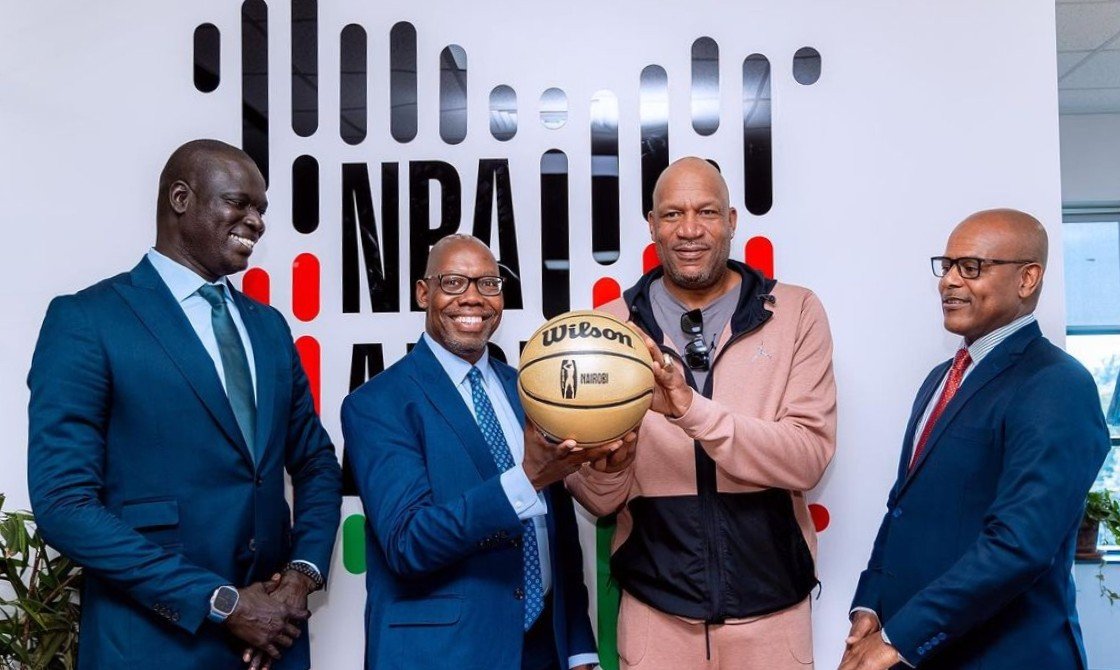(c) NBA Nairobi
🎅🏿 Welcome to this year’s last edition of HUSTLE & FLOW.
In November, Afreximbank announced the 2024 launch of its $1 billion Film Finance Facility, the NBA opened new offices in South Africa and Kenya, and Ghana hosted the first Africa Cinema Summit. Click and read on for more 👇
2023 was the year where the Creative Industries officially landed on the radar of institutional investors. Besides Afreximbank, other financiers such as IFC, AFD Group, AfDB, Sony, Orange Bank, and Birimian Holdings also made big moves. All combined, these investors are now sitting on some $2.5 billion of funds committed to the African Creative sector, which they are itching to deploy.
As these investors prepare to put their cash to work, next year promises to be particularly interesting. Scroll to the end of this edition to discover some of my 2024 predictions 👇
Finally, before we wrap 2023 up I wanted to thank you, HUSTLE & FLOW readers. On Linkedin or directly through my website, you are now 6,253 subscribers to this newsletter.
🌍 Over the course of the year I had the pleasure of meeting many of you in real life in Nairobi, Accra, Lisbon, Casablanca, Paris, Cannes, Marrakech, London and Dakar. I loved hearing that you find my writing useful. Thank you very much for your enthusiastic support and your continued readership.
Happy Holidays to all!
FILM & AUDIOVISUAL
The lack of data on the Creative Industries has long been a serious hindrance to the design of government interventions and to private sector investment. But now, an increasing number of government agencies, development organizations, and industry practitioners are coming together to publish sector-specific reports.
🔎 Last month, the Kenya National Bureau of Statistics (KNBS) and the Kenya Film Commission released the Film Industry Satellite Account Survey (FISA), tracking the contribution of Kenya’s film industry to the economy for the first time.
It’s an enlightening read for those who are not afraid of numbers, and the picture it paints of the Kenyan Film and Broadcast sector is quite vibrant.
A few highlights (2022 data):
📊 0,4% - Contribution of Film and Broadcasting activities to the Kenyan GDP
$570 million (Ksh 86.9 billion) - Gross output value of Film and Broadcasting activities
$250 million (Ksh 38.1 billion) - Gross value added by the sector
$162 million (Ksh 24.7 billion) - Gross output generated by Production activities only
And also:
💪🏾 42,823 jobs created
📃 866 Film licenses issued
📽 39 cinema screens and 14 theaters
📺 6.3 million digital TV subscriptions
🎥 Afreximbank will be launching its $1 billion film fund next year, and that's a game-changer for the African film industry.
Until now, only a few countries - such as South Africa, Morocco, Senegal or Ivory Coast - had access to structured finance for film, mostly through small national funds with very limited budgets.
Overall though, African films are still mostly financed informally through personal funds, corporate sponsors, and a smattering of foreign grants targeted at "festival" films only.
The lack of access to structured, specialized finance has stifled the growth of the African film industry in several ways:
👉 African filmmakers have had to limit their creative ambitions to match the level of funding they could raise through their personal networks, negatively impacting production values.
👉 Many have been forced to work on "commissioned" projects, perpetuating a system in which the buyer (a TV station or a streaming platform) covers the budget plus a production margin, in exchange for all rights to the content.
👉 This means that many African filmmakers don't actually own the IP on the content they created. After the one-off payment from the buyer, these filmmakers are also locked out of any additional revenue resulting from the further distribution or exploitation of their content.
👉 African producers are vastly disadvantaged compared to foreign ones when it comes to securing and developing high-profile IP into films or series. Even if an African producer manages to partner with an international company to co-produce the future "Black Panther", for example, the fact that this producer cannot contribute any substantial funding to the project robs them of their negotiating power, and they are likely to end up owning a tiny fraction of the IP - if any at all.
Afreximbank's film fund aims to change all that.
🚀 Afreximbank's mission is to finance and promote intra-and extra-African trade. In 2020, it identified the creative industries as a new sector with high-growth potential. Indeed, Africa is projected to produce up to 10% of global creative goods exports by 2030, which will amount to roughly $200 billion or 4% of Africa’s GDP.
🏦 Filmmakers seeking to access funding will have to show a solid finance plan, and present supporting documents like pre-sales or distribution agreements.
This film fund will not magically solve other challenges faced by the African film industry, such as the lack of distribution or of professional training programs. But it will make financing available for entrepreneurs with plans to tackle these issues in a sustainable way - and that's progress.
(Disclaimer: Afreximbank is one of my clients).
🇬🇭 🎥 I’m glad to have participated (albeit remotely) in the first edition of the Africa Cinema Summit, taking place mid-November in Accra, at the initiative of the National Film Authority of Ghana.
🎤 I had the privilege of speaking about Investment in the African cinema space, alongside my good friend Moses Babatope of Filmhouse Group and Motheo Matsau of Ster-Kinekor.
I made the following points:
📍Institutional investors are still very reluctant to invest in the movie theater business, which they perceive as a dying, capex-heavy industry. In reality, it seems that cinema keeps refusing to die: it was already supposed to perish decades ago with the advent of television, then again more recently with the arrival of the global streaming platforms, and then yet again with the Covid pandemic. But 2023 gave us Barbenheimer and the highest global box office on record.
📍Nevertheless, the movie theater business needs to adapt to new technologies, new trends and the audiences' changing tastes in order to survive. Two viable models are emerging for Africa. First, a high-end, rich entertainment proposal mixing cinema with other attractions for the entire family (restaurants, gaming arcades, beauty and wellness salons, etc) in the same location. Second, affordable, low-cost community cinemas servicing the enormous peri-urban and rural audiences who have so far been unable to access this type of entertainment.
📍Industry operators need to continue to collect data, document their activities, and communicate about the business models that work. As Motheo said, they also need to learn how to speak the investors' language in order to become more convincing.
📍Governments have a huge role to play in creating an enabling environment. The first step is to appoint experienced industry practitioners in key positions, so that cinema professionals have a knowledgeable person to talk to. Other measures that work: passing creative bills and film incentive packages, streamlining complex tax frameworks and removing red tape, offering tax breaks or holidays, and availing land for the development of film infrastructure.
📜 During the Summit, Ghanaian President Nana Akufo-Addo announced a set of measures going in the right direction. However, Ghana’s economic situation is dire at the moment, which might impede the country’s ability to support its film sector.
MUSIC
🎧 The competition for music streaming domination is heating up on the continent.
📱To reach customers, music platforms need telco distribution.
Homegrown service Mdundo, for example, has access to a customer base of 185 million people (and 26.6 monthly active users) through its partnerships with Vodacom in Tanzania, Airtel and MTN in Nigeria, and MTN in Ghana, and South Africa.
Meanwhile, the Chinese Boomplay comes embedded in Transsion phones (sold under the Tecno or Infinix brands) and works with 9Mobile in Nigeria, its largest market. These deals were instrumental in getting Boomplay its 100 million monthly active users.
🦍 But in the world of music, the 500 pound gorilla is Spotify. The streaming giant entered Africa in February 2021, by launching into 39 countries simultaneously. And now, it has picked Orange to launch its first mobile offer in Africa.
🍊 Spotify and Orange Middle East & Africa have partnered to offer all Orange mobile customers complimentary data bonuses to access to Spotify’s service, starting with the Democratic Republic of Congo, Madagascar, Mali, and soon Guinea. Millions of mobile users in these countries will be now able to access Spotify for free when subscribing to an Orange mobile offer.
There is a lot of room for this partnership to grow after this initial phase: Orange is currently present in 17 countries in Africa, serving more than 140 million customers.
GAMING
🎮 Nigerian Game studio Maliyo will be releasing its “2024 Africa Games Industry Report” on December 5th.
I was lucky to get early access to the document. It is a useful tool for those new to the space, especially as it clearly illustrates the budding African games value chain.
Register here to receive the “2024 Africa Games Industry Report” in your inbox.
SPORTS
🏀 NBA Africa is ramping up its activities on the continent.
🇿🇦 Last month, the world’s leading basketball league chose South Africa as the fourth location for the expanded 2024 season of its Basketball Africa League (BAL) due to the nation's strong infrastructure.
Johannesburg will host the Kalahari Conference in March 2024, before the BAL moves on to the already-established Nile Conference in Cairo (April), the Sahara Conference in Dakar (May) and the seeding games and playoffs in Kigali (May - June). South Africa’s team, the Cape Town Tigers, made it to the playoffs in the past two seasons.
NBA Africa will also open two more stores in Cape Town and Durban, in addition to the one that already exists in Johannesburg.
🇰🇪 In Kenya, NBA Africa announced the establishment of a new subsidiary, which will support all of the league’s business and basketball development initiatives in the country. This Nairobi outpost marks NBA Africa’s fifth office on the continent, after Cairo, Dakar, Johannesburg, and Lagos.
🇸🇸 And finally, NBA Africa also announced yesterday a new junior league in South Sudan, which will kick off in early 2024.
WHAT TO LOOK OUT FOR IN 2024
2023 was the year when the Creative Industries started being taken seriously by investors, and this momentum is bound to accelerate in 2024.
Here are my 3 predictions for next year (or the next 5 - I have a tendency to be early):
🔮 Sony’s Innovation Fund: Africa, Silverback Holdings, Birimian’s Fashion debt facility with Orange Bank Africa, and Nollywood-focused funds such as the VEMA Fund from Volition Capital all emerged in 2023. In 2024, we will see the launch of more investment and financing vehicles specialized in the Creative, Sports or Entertainment sectors.
🔮 The worlds of Tech, Media and Sports will become increasingly intertwined. They will share founders and investors. Interesting companies leveraging tech to distribute and monetize high-value sports media properties will be born. The confluence of Sports and Gaming will become increasingly hot for private investors.
🔮 Good ol’ debt will become the financing tool of choice for Fashion houses and Production companies that are profitable but lack working capital to scale. This will be made possible by new programs that will teach bankers about the Creative sector, while providing risk-sharing facilities. In return, creative MSME entrepreneurs will learn how to structure themselves properly, and the industry will finally start to mature.
What other big trends do you see? I’d love to hear your thoughts.
HUSTLE & FLOW will be back next year!

